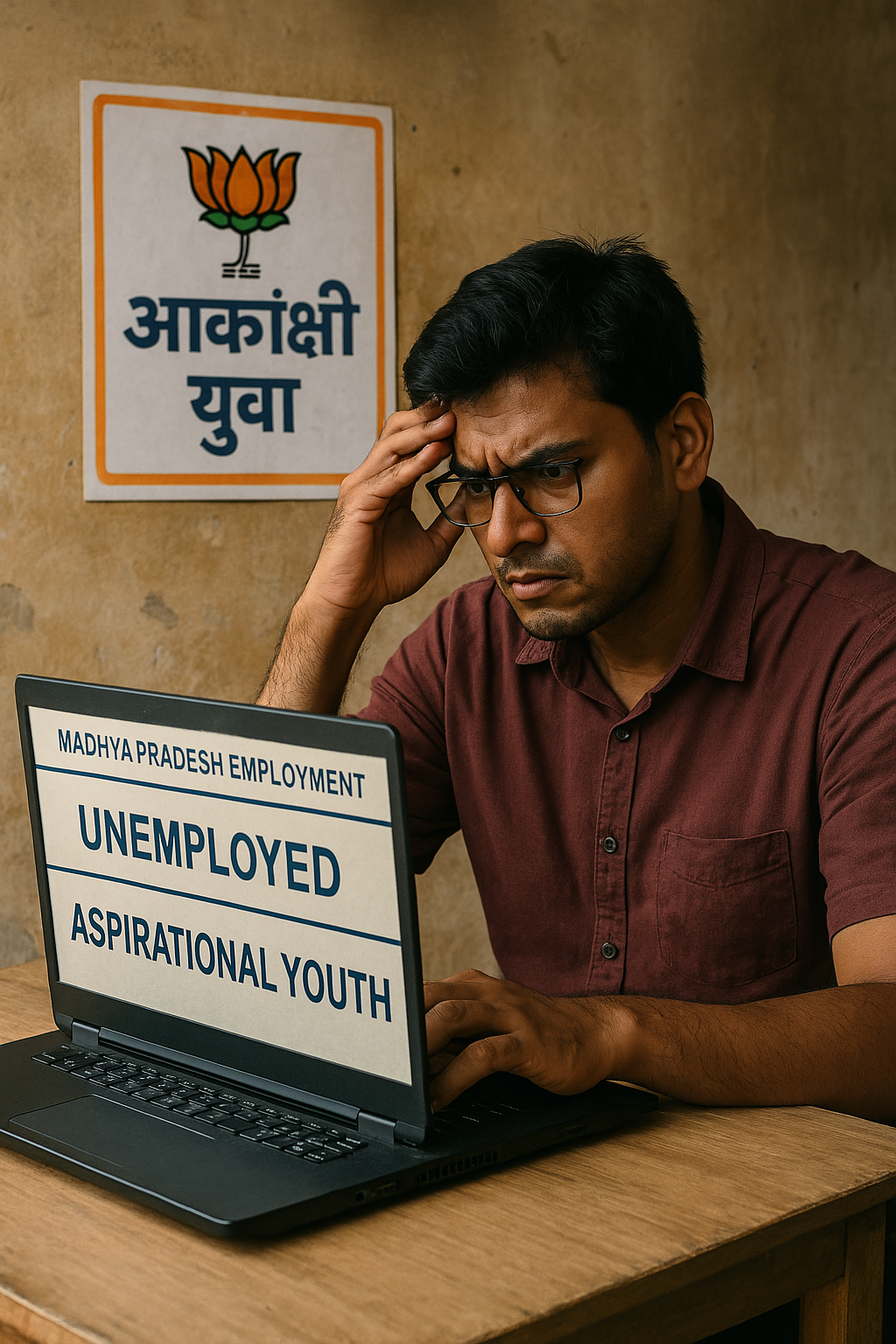
Staring at his laptop screen, 28-year-old Mayank Yadav refreshes the Madhya Pradesh employment portal—a routine he’s maintained for six years since completing his post-graduation. “I registered as ‘unemployed’ because that’s what I am,” he says, frustration edging his voice. “Now, they’ve started calling me ‘aspirational.’ But changing words doesn’t fill my stomach or pay for exam forms.”
Yadav’s grievance stems from a recent decision by the Bharatiya Janata Party (BJP)-led state government to officially replace the term “jobless” with “aspirational youth” (Akankshi Yuva) in all official communications, employment portals, and offices. The move, touted as an effort to foster positivity, has ignited a fiery debate over semantics versus substance in addressing India’s unemployment crisis.
A Shift in Terminology, A Storm in Discourse
The state’s labor department quietly rolled out the change last week of March 2025, altering language on its employment portal and across 53 district employment offices. According to official data, over 2.93 million young people—now termed “aspirational”—are registered on these platforms, seeking government jobs or entrepreneurial opportunities.
Defending the rebranding, State Labor Minister Gautam Trewal argued that the old label unfairly stigmatized youth. “Many registered individuals are already employed in private sectors or running small businesses but aspire to secure government jobs,” he said. “Calling them ‘unemployed’ creates a negative perception. ‘Aspirational’ reflects their drive to achieve more.”
Critics, however, see the move as a thinly veiled attempt to sidestep accountability. Opposition leaders, job seekers, and economists have slammed the decision as “cosmetic,” accusing the government of prioritizing rhetoric over tangible solutions. “The BJP knows how to fool people. With one word change, they’ve magically erased millions of unemployed youth,” said Vivek Tripathi, spokesperson for the Madhya Pradesh Youth Congress.
Between Aspiration and Desperation
For many like Yadav, the linguistic pivot feels dismissive. After years of fruitless applications, he now works part-time at a local shop to fund his relentless pursuit of government exams. “If I’m ‘aspirational,’ does that mean my struggle isn’t real?” he asks. “The term hides the truth—that there are far more candidates than jobs.”
His sentiment resonates with thousands. On social media, hashtags like #AkankshiYuvaReality and #JoblessNotAspirational have trended, with users sharing stories of delayed exam notifications, shrinking vacancies, and the mental toll of prolonged unemployment. Data from the Centre for Monitoring Indian Economy (CMIE) underscores the tension: Madhya Pradesh’s unemployment rate hovered at 4.5% in May 2024, marginally lower than the national average but still reflecting systemic gaps.
Government’s Counter: Entrepreneurship Over Dependence
Chief Minister Mohan Yadav, however, insists the terminology shift aligns with a broader vision. “In a nation of 1.45 billion, government jobs account for just 1% of employment. We cannot rely solely on them,” he said at a recent press conference. The state, he emphasized, is channeling efforts into skill development and entrepreneurship schemes to empower youth.
Initiatives like the Mukhyamantri Udyami Yojana, offering loans and mentorship to young entrepreneurs, and partnerships with private firms for job fairs have been spotlighted as progress. Yet, skeptics question their reach. “These schemes exist, but awareness and accessibility are low,” says Indore-based career counselor Priya Sharma. “Many graduates don’t know how to apply or lack the capital to start businesses.”
A National Debate with Local Roots
Madhya Pradesh’s controversy mirrors a larger national discourse. In 2023, the Union government faced backlash for excluding unemployment data from periodic labor surveys. Economists argue that India’s demographic dividend—its youth-heavy population—risks becoming a liability without urgent reforms in education, job creation, and formal sector expansion.
“Renaming unemployment doesn’t resolve its root causes: skill mismatches, stagnant industries, and bureaucratic delays in hiring,” says Dr. Aniket Deshmukh, a Bhopal-based economist. “Policymakers must address why even educated youth chase scarce government jobs instead of private roles.”
Words or Work?
As debates rage, the state’s “aspirational youth” remain caught between hope and hardship. For every success story of a small business owner benefiting from state loans, there are countless others like Shreya Verma, a 25-year-old MBA graduate from Jabalpur. “I’ve applied for 87 jobs in three years,” she says. “Call me what you want—but unless more vacancies open, I’ll stay ‘aspirational’ forever.”
The BJP’s linguistic gambit has undoubtedly sparked dialogue. But for voters ahead of the state elections, the verdict will hinge not on terminology, but on tangible outcomes. As Yadav, the perennial job seeker, puts it: “We need paychecks, not platitudes.”
In a country where language often shapes reality, Madhya Pradesh’s experiment tests whether a single word can inspire change—or merely obscure an enduring crisis.

